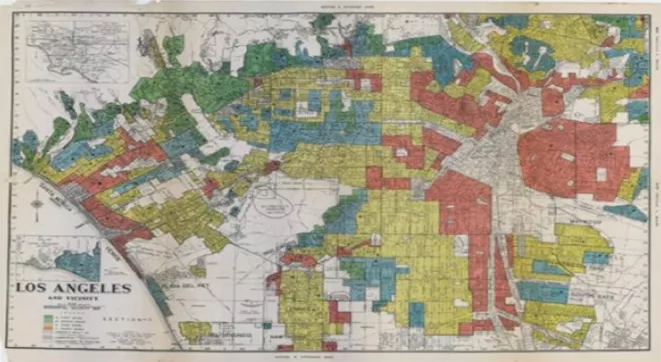Tomorrow, February 7, an interactive traveling exhibit called Undesign the Redline kicks off its Los Angeles residency at L.A. Trade Tech College (LATTC) with a day-long symposium featuring local housing advocates, academics, and representatives from the public sector. [See the full program.]
Photographer Leroy Hamilton posted a preview of what folks can expect to see.
The exhibit was created by Enterprise (an umbrella nonprofit that partners with national and local groups to finance and build affordable housing) in partnership with design studio designing the WE to encourage communities to engage the segregationist policies that still shape the development of their cities.
As L.A. searches for ways out of the current housing crisis and the longer-running affordability crisis in lower-income communities of color, a deeper understanding of the legacy of redlining has become all the more urgent.
The early 20th century practice of denying housing loans to borrowers in communities populated with groups labeled as "subversive racial elements" didn't just deny Black and Latino communities wealth or mobility for generations to come. It also incentivized white families to participate in oppressing those communities.
White residents fire-bombed the homes of Black families, protested the integration of schools, signed contracts agreeing never to sell their homes to African Americans, found creative ways to zone their communities, sued their neighbors for selling to Black families, formed roving gangs to harass and beat up folks of color, chased Black people out of sundown towns and denied them services, and lobbied to protect their own communities from environmental harm, to name a few.
These practices helped embed white-centered narratives and policies in our planning infrastructure, allowing segregationist frameworks to persist long after segregation was officially outlawed.
Redlining implicates all of us, in other words - the communities that were discriminated against and the communities that participated in and reaped the benefits from that discrimination.
Tomorrow's symposium will explore what that means in practice and how we can address that legacy of harm (see agenda, at right).
County Supervisor Mark Ridley-Thomas will offer opening remarks at 10:30 a.m., but participants are invited to arrive at 9 a.m. for a guided tour of the exhibit.
The exhibit will remain at LATTC through March 31. It will feature a special lecture with The Color of Law author Richard Rothstein on February 27, and offer guided tours by appointment. [Click here for more details.]
Find the exhibit in the Magnolia Hall Atrium on the LATTC campus (400 W. Washington Blvd.). The symposium will be held in the South Tent (next to Aspen Hall) from 10 a.m. to 3:30 p.m. Exhibit hours through March 31 are 10 a.m. to 6 p.m., Monday through Friday.






